Through a Consultant's Eyes: A Glimpse of Oral Bible Translation
Evelyn Gan serves as a Bible translation consultant with Wycliffe Malaysia, and is part of the Area Consultant Taskforce for the Wycliffe Global Alliance’s Asia-Pacific Area. She works with two oral Bible translation (OBT) projects: the Penang Hokkien in Malaysia and the Kahak (pseudonym) in a neighbouring country.
What are some of the opportunities you have experienced with OBT?
The Penang Hokkien is actually quite close to my heart, because I’m also Hokkien. But it’s a different sub-dialect. Like most of the Chinese languages that have come over to Malaysia, they have become what you call colloquialised, meaning, they have changed, they adopted a lot of local words, and sometimes even the grammar is slightly different.
YWAM is our partner in this project — they actually started the project and they started off with the JESUS film. Then I got involved because they needed a consultant. After that, they were all excited. They said, “We can do this. We can give Scripture to our people.”
And so they wanted to do more. At first they were thinking of a written translation, but a lot of Malaysian Chinese here, they either go to Chinese school or the national language school or English school, so they don’t share a common script. So what script do you use? If you use Chinese, then these people will not be able to read it. Hokkien is the lingua franca (bridge language) of Penang. You don’t have to be Hokkien to speak Penang Hokkien.
So I suggested to them, “Why don’t we try oral translation? At that time, Faith Comes By Hearing (FCBH) was really wanting to start a new project. So people got in touch with people, and then that’s how it started. It’s exciting to see how God brings people together — YWAM, FCBH, the local church, and pastors who are involved in the Hokkien ministry. All four organisations got together to do this project.
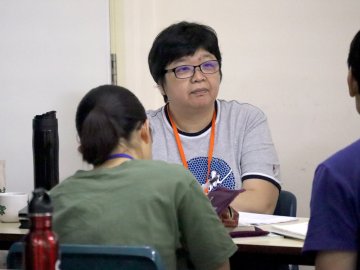
What are the differences between OBT and the written translation you have done in the past?
In OBT, the passages are divided into what you call sets. So one set is like one story from the Bible. The most exciting thing for me is that we are able to use an oral translation as soon as I approve a set. Nowena, who is the coordinator, will take it and put pictures to the audio, and send it to someone who puts it into video. And then we send it out. So it’s unlike a written translation where you have to wait until you finish the whole book to print and distribute it. OBT is more instantaneous.
If I compare working with a written translation, I find that when I’m checking [OBT] with the community, more people get more excited. Somehow, when it’s a written page, they tend to be more careful in answering. But because it’s oral, they hear it and they respond more enthusiastically. They’re not afraid to tell what they think.
It is not that one is better than the other. They are different for different needs.
Is OBT more difficult in some ways, also?
I guess the challenge that all OBT projects face is when we discover that there is actually a better way to say something. How do you change it? You know, with written translation, you can do a “change all” to correct it. But with OBT, do we re-record the whole thing? Do we have time to re-record? Can the translators remember five stories back or five sets back?
When it comes to recording, you can’t change just one word. Even if you change a paragraph, you have to make sure that there’s no difference in the background. The sound will not be the same.
Some of the sets that we did were very long. There was one set that was the whole chapter. So by the end, the translator’s voice was heavy and hoarse. She couldn’t really speak after that. And the more anxious you get, the more mistakes you make. You miss even one small word, or you mispronounce something, because you want to get it right. So if you get it wrong, you have to re-record the whole thing.
Our translators are in their late 50s, early 60s. We don’t get very young people. Living in Penang, a small city, it’s hard to find people to be involved. Even our translators are not full time. They all have their other ministries. So that’s one of the other challenges.
We all communicate orally, but we don’t see ourselves as an oral society. So when is a culture considered an oral culture, and what are some of the characteristics of oral people, especially those you’re working with in Malaysia?
That’s such a difficult question! But I think in Malaysia, we are basically an oral culture. It’s just that we’ve been trained in literacy. Therefore, it’s a tool and it’s like, because you have a phone that takes great pictures, you take the picture. And it's the same thing with us. We might be very oral people, but because we have a tool, which is the written or typed word, we can rely on that. Like in a Christian circle, people enjoy Bible studies where they can speak out what they want to say, and then they prefer if somebody tells them instead of having to read a book. I think that shows that you’re pretty much more oral and from an oral culture.
In Penang Hokkien, we don’t have a written script. That’s why we went oral. But also, most of our target group are older people who either don’t want to read anymore or because of their eyesight, find it difficult to read. So they prefer to listen. And if they have to use the eyes, they prefer it to be in video form.
So, even though I grew up in a very literate society, I can be of oral culture also? Right? And maybe I was more oral when I was little and when I’m older, while I tend to be more read-and-write now in my middle age?
Some people are more visual when they learn. Some people are more oral. But we also have [preferences] generally, as a culture, as a community. For example, how do we prefer to learn a skill? Like our mothers don’t give us a recipe but just show us? And then you ask her, “How much? How much salt? How much flour?” And then she says, “Well, you put in one cup. If it’s not enough, you put more. If it’s too much...” That’s not really an answer. But generally, that’s the way my mom taught. You know, when she cooks, I just stand and watch. I help her. And I think that’s how most oral cultures would actually teach people how to do things.
Another example would be: My husband used to help out in indigenous churches up and down the mountain. So there’s this particular church, a very small church. And when he preaches, there will be comments, questions and bird calls. So, he has to stop. When people comment, he has to respond. If they ask questions, he will answer the questions. If the bird calls, everybody will stand up to look at the bird and then he has to wait until everyone calms down. And after that, they continue with the sermon. And then we realise that’s how sermons were many, many years ago, or maybe even in Jesus’ time… it was a back-and-forth thing. And that’s how people process information and learn new things.
I think, basically, a lot of the people in Malaysia are still like that.
So orality is a more natural way of learning and to listen, and reading and writing is a skill set you have to learn. Orality is something there when you are born.
Yes, we pass down our tacit knowledge by observing, watching and listening.
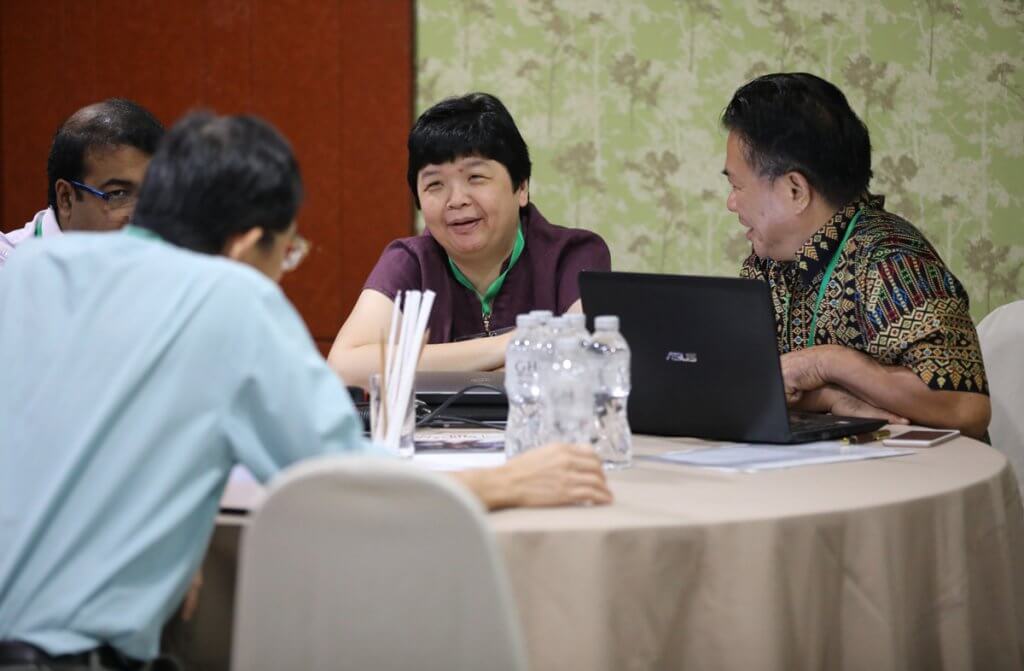
During Global Connect, you joked that OBT just borrows or steals the consultants from written translation. What are the challenges for training consultants for OBT? What is the difference in the skill set required?
I’m also a borrowed consultant from a written translation background!
I think, basically if you’ve been a written translation consultant, you would know how to check an OBT because you have to make sure that the exegesis is correct. A lot of the skills are the same except that it’s not written down. When you check oral translations you have another layer to check, the extra bits of speech. Like when we speak, our intonation has meaning, even pauses — how long you pause tends to give added meaning, and the volume of your words — whether you speak very loudly, softly, whether you whisper... that gives extra. So you have to listen for those things.
Also, spoken discourse and written discourse are very different. In written form, if you repeat the same thing again and again, people get tired. It’s like us reading Hebrew poetry. OK, you said it already, why are you saying it again? It depends on the language we speak, too.
In spoken discourse, repetition is OK. In fact, we need to repeat because in written form your eyes can just look up. You think, OK, that’s the information above, so I connect it to the bottom. But with your ears, we forget once it goes through. So repeating is not a problem at all and repeating sometimes gives emphasis. So you have to consider things like that.
And then in spoken language, spoken form, we tend to use certain forms that we wouldn’t use in written form. Again, the Chinese languages have a lot of [filler words] like ho, ma, le, law, la. We might not put them down in writing. But when we’re speaking, if we don’t have them, it sounds like something is missing. So you would have to listen for things like that.
Also, we do emotional exegesis. In written form, you will have “Jesus rebuked Peter”. But when it’s oral, you would have to ask: How did he rebuke? Did he rebuke sternly? Did he raise his voice? How is this rebuking different from “rebuke the wind”? And how would he say it differently? Also, do I have to raise my voice? If he’s rebuking the wind, the wind is very loud. Does he have to shout at the wind? Or not? So these are the little things that you have to consider.
With emotional exegesis, the sign language people are way ahead. We could actually use the sign language translation as a resource for emotional exegesis. I think I was pretty blessed because one time a translation colleague — she does sign language — was in Kota Kinabalu, and she invited us to observe her while she was community checking with the team. That was eye-opening. There are other things that will affect the meaning of translation. With sign language, it’s the height of the hand, it’s your facial expression. So when I did oral translation, those things came back to me.
Does this mean that experience in written translation is not necessarily a requirement to be a consultant for OBT? If someone has experience with Deaf people, for instance, maybe that’s even better if they jump into OBT?
The Asia-Pacific Area Consultant Taskforce (ACT) is actually working toward getting people from OneStory or Oral Bible Storying, people who already have experience in orality on a pathway towards becoming consultants for OBT.
I think for all translations, whether it’s written, oral or sign, the basic things are all the same. That is to make sure the meaning is correct, to make sure it’s clear and natural, and to make sure it’s acceptable. But then there are also extras that you have to listen for or watch for.
When a consultant who was doing written translation now changes to OBT, what are some of the challenges to them and to the translation teams?
With the Penang Hokkien, because I’m the consultant, and I’m the most experienced in the team, I could actually make some of the decisions. I told them I wanted a written back translation, because I was worried that it would be too big a jump for me to have an oral back translation. A back translation is the translation that is translated back into a language that I know, but it’s done in a very literal form.
But at the same time, because I understand enough Hokkien, I would listen to the Hokkien, and I basically knew which verse was saying what. And I could hear the intonation, loud or soft and the emotional part of the recording when they sent it to me, while my eyes looked at the written back translation.
So that was my comfort zone. The team found a back translator, who was happy to do written back translation. She found it a challenge to do spoken back translation, which took her more time. …If I didn’t understand Hokkien at all, then the spoken back translation would actually be better. But then my challenge would be to be able to process all that information, especially when I’m checking for accuracy.
I remember Swapna (Alexander, of FCBH) saying that she had to listen about 20 to 30 times to something because she wasn’t sure. You know, she was just trying to catch it. So it’s a different skill that you would have to learn. Some people will be better at it, because some people are more oral than other people, and more visual.
The ACT just started a new initiative on OBT. It’s still in a very early stage, but would you tell us about it? What is this initiative trying to achieve?
We realised that instead of relying on consultants from written translation to do checking, we also think that there will be more people doing OBT [only]. So we will need more consultants. We have this big group of people who have been involved in orality, either OneStory or OBS. They already have the orality background. When you do OneStory or OBS or any type of orality, you already have the skills to make sure that it’s accurate.
And so we thought, OK, let’s provide a pathway where we can get them recognised as consultants. We are almost ready to tell Alliance organisations and partners about this. And we might get started next year.
Do you think OBT is now being prioritised over written translation, or is that a misconception?
I still think written translation is the king in the translation world. But, oral drafting has been around for a long time. A lot of people still draft orally. Then they write it down and record it. It is a better translation and more natural translation. And that’s why they continue to do that.
So I think oral translation is not new. It is getting much attention mostly because of technology. Now you have Render and SIL Transcriber. OBT is actually going back to something people wanted to do a long time ago. The technology just was not there yet.
Do OBT projects eventually develop into written translation projects? Or is OBT the final destination for some languages?
Yes, for some languages, it is the final. It really depends on what the people want. If the people want to have a written translation, then you could take the oral translation and adapt it to a written form. But for some translations, people say, “This is it. We don’t think we want a written translation.”
I think traditionally, in church traditions, having the written form is the Bible. In some places, they don’t even want you to open your phone or your tablet. “That’s not the Bible. The Bible has to be paper!”
So it has a lot to do with the people, the tradition and the needs. With Penang Hokkien, I don’t think [we want a written form]. I say, “Well, if you want to, you can. If everyone agrees, if the church agrees, yeah.” But when we go into the written form, somehow the scrutiny from the pastors would be a little different. They would want it to look more like the Chinese Bible or NRSV or NIV or ESV.
How do you distribute oral Scripture? You also mentioned that it’s not only audio, but also with video?
That was a request from one of the pastors whose church we use for community checking. He said older people actually prefer video. So that’s what we’ve been doing. We put it on YouTube, and then we can send the link. The pastor likes it, especially because of COVID and the older folks are not allowed to gather in church. So they send out the video links or the videos through WhatsApp. Because we live in a city, nearly everybody has a handphone (cellphone). And older people have their own handphones or tablets.
We have done one book, and FCBH will check the recording to make it as good as possible. Then we can actually share that – on CDs, if anybody uses those anymore, or SD cards. With the Kahak group, people are supporting them by giving them funds for buying SD cards and MP3 players, and they distribute them. Every few months, they update the playlist as they do more recordings. Those who received the MP3 players will go back and exchange SD cards, so that they will be able to get the newest recordings. And by doing that, the relationship is there because you keep going back to those people.
People like it. Some of the MP3 players are quite big and some are smaller. I’ve seen the bigger ones. One lady says, “I love this, you know, I just put it in my shop and I played loudly. And I pray that my husband will listen to it and come to know the Lord.”
I know you have some great news from people engaging with the videos and audio, right?
This is a little story of the general secretary of the Bible Society of Malaysia. He was excited because he said that someone told him that he had given a video to his grandmother, you know, to watch Penang Hokkien. After watching that video, I think maybe the pastor was involved also, maybe he was sharing with his grandmother, and then she accepted the Lord.
And another time, when the translator was checking her translation, she came to the part where Jesus was feeding the four thousand and the five thousand. Jesus looked at the people and he felt compassion for them because they were like sheep without a shepherd.
The translator felt moved to ask the person who was helping to check, “Do you want to accept the Lord? Do you want Jesus in your life?” And the person said yes. And after they led him through prayer, they asked him, “What was it that moved your heart?” And he said, “When I realized that Jesus looked at me and he had compassion for people, I feel like I’m one of those sheep that is lost.”
So because it’s in Penang Hokkien, people are more open to listening to it. Even my brother-in-law, who didn’t really want to have anything to do with Christians, was willing to listen to the translation just because it’s his language.
Interview by Ling Lam, Wycliffe Global Alliance
Alliance organisations may download and use the images from this article.
Related story: OBT moves to the forefront
The latest
View all articles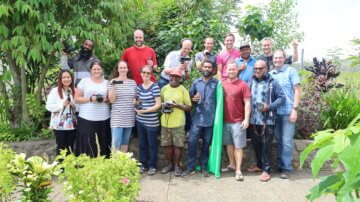
03/2024 Pacific: Papua New Guinea
Informing, teaching, inspiring: PNG workshop teaches video storytelling for language communities
PNG workshop teaches video storytelling for language communities
Read more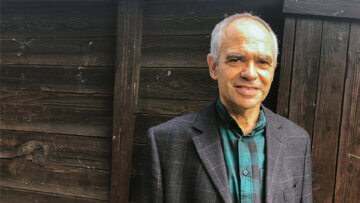
02/2024 Global
Looking ahead at 2024
As the year unfolds, we marvel at the work of God in our rapidly changing world. And, we look forward to a number of gatherings and conversations intended to draw us together.
Read more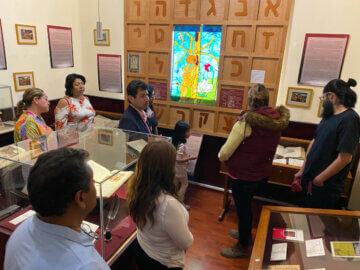
01/2024 Americas
Telling the Bible's Story
It may come as a surprise that a museum is among the Wycliffe Global Alliance organisations.
Read more